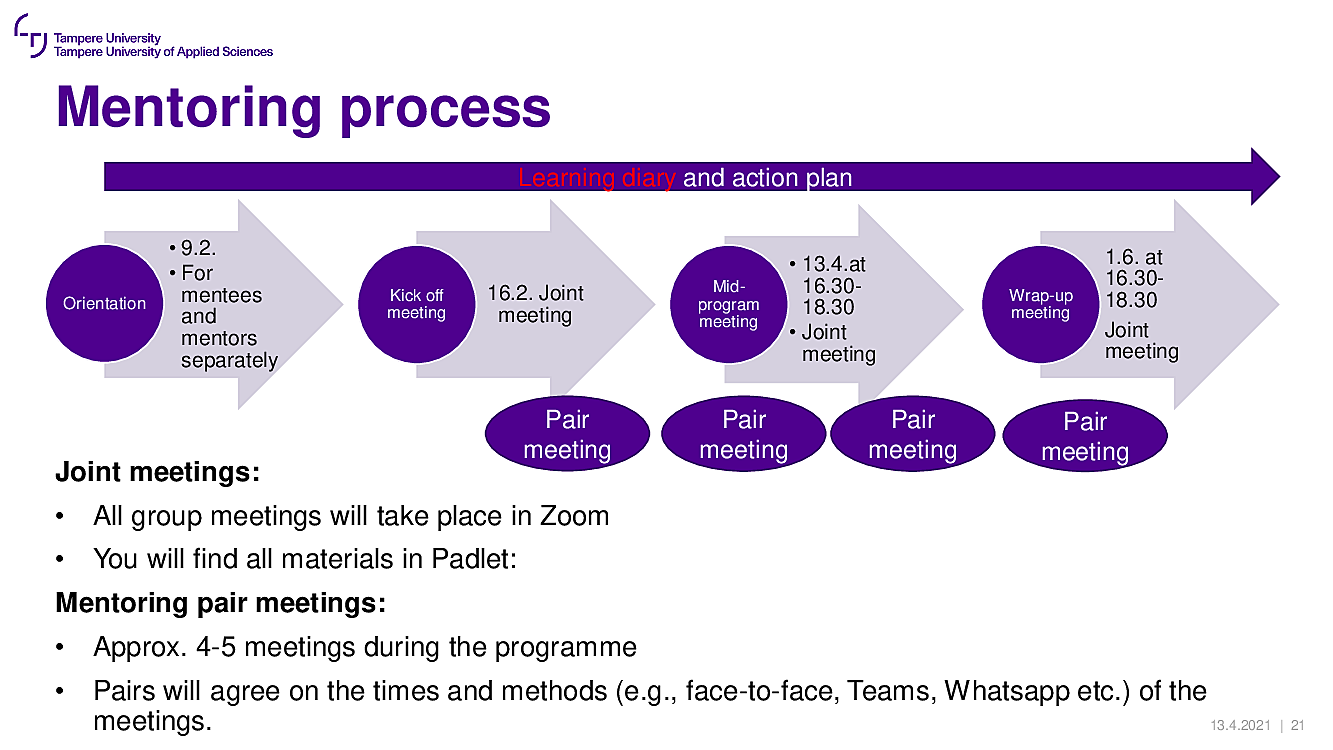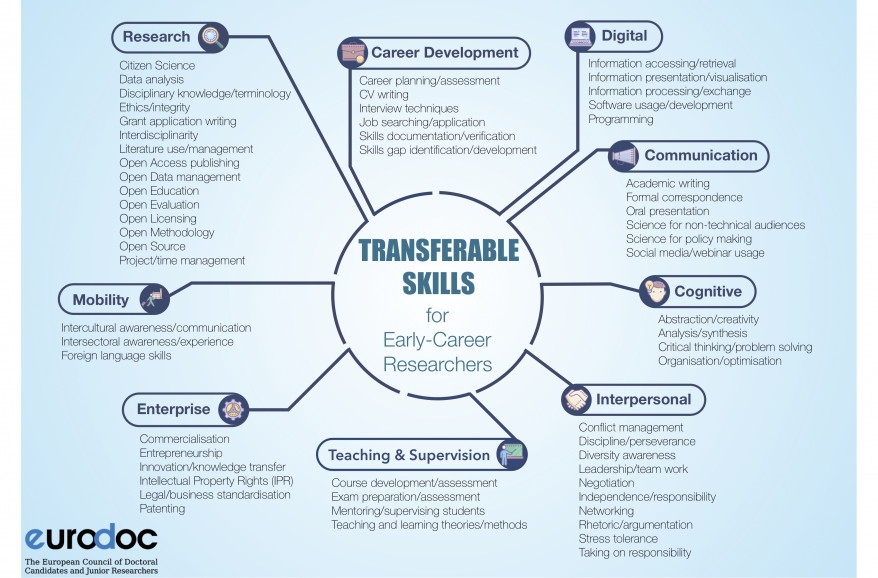Today is Ascension day in Sweden, and it seems like a good time to elevate my spirit a bit to start my blog. I’ve recently participate in the Tampere University Doctoral Student Mentoring Program 2021, and found it really inspiring and pleasant. Here follows my experience and what I learned in this program.
What is this program about?
The program is aimed at graduating PhD students at Tampere University for their career advancement, continuous professional growth and network expansion. Mentors were found around the globe, who are experienced professionals in either the academia (namely professors and researchers at different Europeans universities), or successful companies. I found the advertisement on Linkedin and felt delighted to be accepted to share my experience, competence and ideas with all participants. Mentors and mentees are matched based on their areas of competence and professional interest, and most of us are organized in pairs.
Overall, the program is well organized by the HRs from our university with an orientation attended by mentors and mentees separately at the beginning of February, a group session by sharing knowledge and gains when running half way through in April, and we will finalize the program on the first day of June. Mentors were provided with essential coaching tips during the orientation and knowledge sharing in the mid-term meetings, and group sessions were intended to find and solve common questions from the mentees. We met the mentees (virtually on Zoom) in another meeting after the orientation, and pair meetings were planned by the individuals. Generally speaking, 2-3 pair meetings were held in each half of the program.

How does it work in my mentoring sessions?
To answer this question, I need to firstly explain what motivates me to join this program. Back in 2019, I saw a video posted by a former colleague in the same department at Tampere University in which she described her struggles in job hunting and how she received some help from an professional agency specifically for PhDs. It suddently stroke me about how much efforts and frustration I had when trying to get out of the “academic bubble” one year earlier. I simply felt that something should be done to help PhD students to improve the situation, especially for my university in Tampere.
I believe it is important to share my motives with all the participants in the program when it started, and it helped to develop the psychological safety with my mentee in our first pair meeting. Let me expand a bit about psychological safety. I increasingly find it a critical factor in our work life which affects people’s behaviour. This word is rather broad which covers feelings originated from physically safe, job security and trust. Simply put, it’s getting harder to feel safe and trust people in this complex society. Feeling safe psychologically is so delicate that it may take weeks or months to build up, and can still be easily broken between parties due to conflict of interest or even cultural/racial differences. However without it, it is almost impossible to work together, cultivate creativity and improve.
My mentee and I agreed to have bi-weekly meetings, and as usual, the first meeting was about getting to know each other and building trust. Mutual understanding was developed by clarifying each other’s role, asking and answering questions, and an emphasize on respect and protection of personal information. We quickly found some common people we know in the university and I felt grateful that the level of trust grew quickly in the first few meetings.
Setting goals and action plans had followed in the next meeting. The action plan was continuously updated when I started to know better about my mentee and help her identify her competence and gaps to the job market. My mentee is a bright and talented young lady with strong data analytics skills in the finance context. She has a clear goal in her mind and my role is mostly about creating the fomality of mentoring sessions and listening with some guidance on competence development. In total, we had 4 meetings on competence development. Since the sessions are driven by the questions from the mentees and I understand that she is a high achiever, our approach is mainly exchanging opinions about the references (a curated list of links on job ads, general career advice, interview tips, advices for data science and engineeing and some relevant forums) which I found helpful for her professional development.
Now, the program is drawing close to the end. We have finished the topic of competence development in our pair meetings, which we kept reviewing our actions and discussed about what skills should be continuously enhanced for the job market. We also tried to match our competence to the target companies. A clinic session was also held to address how to develop professional skills. We touched upon a range of topics including networking at pandemic times, CV polish, transferrable skills and business acumen. Moreover, we had a meeting about personal values and ambitions, and agreed that technology for the common good is what we are aspired for. :-) Meanwhile, challenging tasks and pleasant atmosphere are also important in our working life.
What did I learn?
It has been a while since I finished my PhD, and when I look back, there are several skills I could have strengthened during that period. For example, communication skills are one of them. Like a mentor from India said in our group session, negotiation and conflict management is also becoming important in the business world. Doing a PhD in Finland is extremely good for being focused and doing indenpendent work in the quiet environment. But communication and being collaborative is essential when working outside the academic bubble. Another skill I really valued in the process is to be a good listener and learn to intervene at a good time. It feels like a driving instructor at a latter stage when sitting besides the student driver. To sum it up, these interpersonal skills are going to be my focus for development in the future. Here below, I would also like to show a set of transferrable skills which should be possessed as a PhD student.

My other reflection is about personal branding and core competence, which I gradually understand its important with an increase of my work experience. Though sitting in a large corporation and bombarded by the word “roadmap”, I have realized the company structure has become agile and flat. It pays emphasis on the capability of a team and for an individual it relates to the career identity and fulfillment, which is a new paradigm for continuous development to achieve a personal career goal and value. On the other hand, capitalizing the talent is equally crucial. For me, I believe that it’s time to strengthen my confidence and seek opportunities in developing my talent and aspiration in Edge AI.

Final thoughts
One thing I feel particularly happy is that I gradually guided my mentee from job hunting as an urgent issue to the long-term career advancement. We also talked about OKR as a tool for personal development. There will still be one more pair meeting and the final group meeting, and I really look forward to them. This program is a nice setup for the PhD graduates to get prepared for the job market, and I hope it will continue to evolve in the coming years. Though the pandemic impedes people gather together and have spontaneous interactions, more mentors around the globe are able to join to share their experience and expertise. It is a wonderful idea and worked well! Personally, I was trained to be an engineer in the Finnish doctoral program, and understand the craftmanship and sisu spirit of Finnish education. Hopefully it will be integrated with a business acumen to match with the future market.